Transclucent calls on the EHRC to take action to address barriers to transgender healthcare.
As any ardent armchair football fan will know, rules implemented many years ago are today being changed without any regard for what the rules were actually intended.
The offside rule, which is now decided by VAR technology, is a perfect example. For very good reason, offside was needed to prevent ‘goal hanging’ and when any attacking player was deemed to have an ‘unfair advantage’. So in a normal circumstance, any attacking player alongside a defender was deemed ‘level’ and onside, and ‘the benefit of the doubt’ was intended to go to the attacking side.
But now we have the technology to calculate with some degree of accuracy a players position when the ball is passed forward, and offside decisions are now based on a players ‘toenail’ being fractionally goal side of the last defender. How a toenail can give any attacking player the slightest degree of advantage is totally beyond me, and this is the point I make; those making the changes today are giving zero regard for what a rule was clearly intended for.
Some will say, with understandable reasoning, that interpreting the rules in football with no regard for what was intended is both annoying and frustrating, but in the scheme of things it’s not exactly a life and death issue.
But right now, a total disregard for what laws were intended for is being played out in a far more important and genuinely life threatening circumstance.
On 21st February 2023 a request was made by the Government’s Women and Equality Minister Kemi Badenoch for advice from EHRC on the way the Government could approach a clarification as to a definition of ‘sex’ in relation to the Equality Act 2010.
As many reading this article may now be aware, the EHRC issued a formal response on Monday 3rd April and the level of outrage and condemnation from those supporting and protecting trans rights has been loud, clear and immediate.
At a subsequent meeting to review the actions and work of the EHRC (which was pre-planned so not intended on this subject) the EHRC faced the full wrath of those representing LGBT rights, a meeting that included our own TrasnsLucent Director, Steph Richards, Helen Belcher (as reported on by Helen here) and Jayne Ozanne (twitter comment).
So the starting point in looking at any definition of ‘sex’ has to be Gender Reassignment in the Equality Act 2010, taking a step back to think about its true purpose. What was the intention of the Act in relation to transgender rights?
Quite simply, the reason for transgender inclusion within the Act was to recognise and protect the human rights of a small percentage of the population who are NOT defined by the sex they were assigned at birth.
It seems an obvious statement to make, but everyone who defines themselves by their birth-sex, is by definition cisgender, and by clear reasoning, all those who do not are transgender. Therefore, right from the very onset it is baffling how there could be any logical talk of now introducing an EA10 definition of sex to mean ‘birth’ or ‘biological sex’. This definition would totally contradict all of the protections that the Act was intended to provide.
The Act states that ‘a person has the protected characteristic of gender reassignment if the person is proposing to undergo, is undergoing or has undergone a process (or part of a process) for the purpose of reassigning the person’s sex by changing physiological or other attributes of sex’.
If the Act is changed to ensure ‘sex’ can only mean ‘biological sex’, then this protection becomes completely meaningless as there is clearly no protection if providers of any service can simply restrict entry to birth sex without need for any reason or justification.
It is abundantly clear that the EHRC recommended change doesn’t, as they state ‘clear any perceived confusion’, it simply removes all the rights and protections that the 2010 Act intended for those with the protected characteristic of ‘Gender Reassignment’.
It is important to ask; if a trans woman is no longer legally acknowledged as a woman, what is the purpose of transgender inclusion within the Equality Act? The bottom line is that the Gender Critical movement achieves their ultimate aim to remove trans women from being recognised and accepted in society. Trans men and non-binary people will clearly suffer the same fate.
The basic position of the EHRC recommendations to the Government here went straight to ‘Discriminate against trans people’, going completely against every intended principle of the Act, and the very mandate of the Equality & Human Rights Commission, which was explicitly set up to protect the rights of those who face unjust discrimination.
So now onto the letter itself. The EHRC have made their recommendation and stated that:
“we believe that redefining ‘sex’ in EqA to mean biological sex would create rationalisations, simplifications, clarity and/or reductions in risk for maternity services, providers and users of other services, gay and lesbian associations, sports organisers and employers. “
Even in this simple statement they openly admit that they are ‘redefining’ the interpretation of ‘sex’ and therefore encouraging the Government to change the current definition that protects trans rights.
This is therefore not the clarification of the Act, which some have been asking for, but an admission that this is a totally new definition.
Which means that their revised ‘Single Sex Guidance’ which the EHRC published last year is both erroneous and unlawful, containing a definition of ‘biological sex’ that does not exist in UK Law. In short, they made it up. It also goes against the findings of the Judicial Review conducted by Lady Haldane, in which the EHRC took part and agreed with. Talk about contradictory.
But is a change even needed? It is apparent that outside of a small, vocal and hateful minority, the general public has little interest in this issue. According to the latest More In Common poll from March 2023 (https://www.moreincommon.org.uk/our-work/research/britons-and-the-cost-of-living-march-2023/), transgender issues still rank at the very bottom of the list when
it comes to assessing the most critical issues facing the UK today.
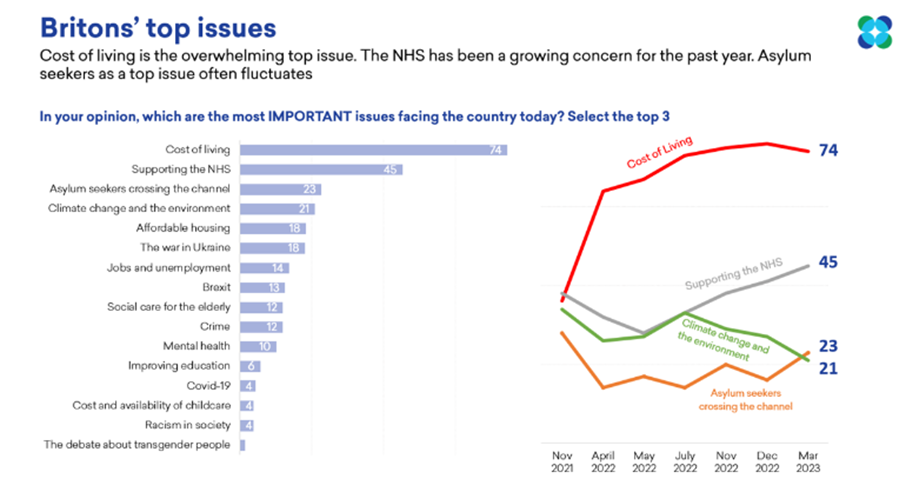
The EHRC implies that there has been a change in society that is driving this change, but the fact is there exists a tiny element in society today that does not accept the existence or rights of those who are transgender, and that should never be used to justify removing trans rights. The call from many on both sides has been clarification on what the Act intended and not a call to completely change it.
The legal rights established in the Equality Act 2010 are precisely to protect transgender people from such hateful, discriminatory actions and beliefs, so it is incomprehensible and appalling that the EHRC should ignore its human rights mandate as a NHRI and recommend that the rights to protect a vulnerable minority should be removed.
Despite showing they have no understanding of what ‘biological sex’ actually is, nor how it could be proven, the EHRC boldly claimed that the introduction of a definition of ‘biological’ sex , “would bring greater legal clarity in eight areas”.
So let’s look at the 8 ‘improvements’ they maintain can be achieved:
1) • Pregnancy and maternity: As things stand, protections in the EqA for pregnant women and new mothers fail to cover trans men who are pregnant and whose legal sex is male. Defining ‘sex’ as biological sex would resolve this issue.
The legal case of Freddy McConnell has already established that trans men (assigned female at birth) remain mothers. This EHRC position would deny the lived, experienced sex/gender of trans men in law by continuing to refer to and treat them in a discriminatory manner as ‘legally female’, even if they hold a GRC.
If they did want to address this minor issue, a simple addition to state ‘pregnant mother or person‘ would include trans men would quickly resolve this issue. This is clearly easily resolved without changing or removing all legal protections for all transgender people. The recommendation of the EHRC clearly is not required to add ‘clarification’ in this area.
2) • Freedom of association for lesbians and gay men: If sex means legal sex, then sexual orientation changes on acquiring a GRC: some trans women with a GRC become legally lesbian, and some trans men with a GRC become gay men. As things stand, a lesbian support group (for instance) may have to admit a trans woman with a GRC attracted to women without a GRC or to trans women who had obtained a GRC. On the biological definition it could restrict membership to biological women.
The first part of this statement is simply nonsense. The holding of a GRC has absolutely no material impact on a person’s sexuality which is defined by self-identification; and furthermore there is no such formal documentation detailing whether someone is ‘legally gay or lesbian’.
But it is clear from this supposed clarification that the EHRC is suggesting that organisations should be legally protected so as to be able to impose ‘blanket bans’, which is expressly against the provisions of the EA2010. Under the existing conditions, organisations already have the full legal right to discriminate as long as it is a ‘proportionate means to establish a legitimate aim’. The impact of this recommendation is to enable discrimination when no proportionate means are implemented and even when there is no legitimate aim to do so. Consequently, any organisation could lawfully discriminate if its motivation was based purely on transphobia.
Under the current provisions, every organisation with a genuine and legitimate aim can use proportionate means to discriminate. This example given by the EHRC does provide clarification, but it is a clarification that permits clear and unchallengeable discrimination.
However, let’s suppose that sex in the Act is defined as ‘Experienced Sex / Gender Identity’, and the exemptions remain in their current form. In that case, this provides the required legal protection for transgender people but also enables organisations to discriminate for justifiable reasons via a proportionate means to achieve a legitimate aim. The recommendation of the EHRC in this area would be to legalise acts of transphobia, in effect legalising direct and indirect discrimination
3) • Freedom of association for women and men: As things stand, a women’s book club (for instance) may have to admit a trans woman who had obtained a GRC. On the biological definition it could restrict membership to biological women.
Once again, the impact of this recommendation is to enable discrimination when there is no proportionate means implemented and no legitimate aim to do so. One would have to ask the question, on what justifiable basis does the EHRC believe a book club should be legally permitted to discriminate against and exclude someone trans?
Using the example given, the intention is that no reason is required and a service provider should have the legal right to ban trans women without the need to provide any justifiable reason. This example therefore also permits clear and unchallengeable discrimination, and without any clear evidence that this point raised is even an issue. Once again, the recommendation of the EHRC in this area would be to legalise acts of transphobia.
4) • Positive action. Currently, trans women with a GRC could benefit from ‘women-only’ shortlists and other measures aimed at increasing female participation. Trans men with a GRC could not. A biological definition of sex would correct this perceived anomaly. 1 For background see annex. Arndale House, The Arndale Centre, Manchester, M4 3AQ equalityhumanrights.com
This appears to embed direct and indirect discrimination, and defining trans men as ‘legally female’ on such lists would remove the Article 8 right to privacy by ‘outing’ any trans men who stood in this manner.
There is also no basis for claiming that this ‘positive action’ would have any such impact as implied, especially given the low numbers of transgender people revealed by the 2021 Census. Trans men are men, and the whole reason for living their life in their true identity as a man means they would have no reason or desire to be considered or included in any ‘women-only’ shortlist.
For the EHRC to claim this is an example that would benefit a ‘biological’ definition is total nonsense and shows a complete lack of understanding of those being transgender.
5) • Occupational requirements. Employers are sometimes permitted to restrict positions to women or to men. An employer can (for example) require that a warden in a women’s or girls’ hostel be female. At present, such a role would be open to a trans woman with a GRC, but not to a trans man with a GRC. A biological definition of sex would correct this perceived anomaly.
Employers have the right to employ whomever they feel most suitable for the vacant position, but should never be permitted to discriminate based on personal characteristics, whether that be skin colour, religion, sexuality, gender – or gender reassignment. Once again, discrimination should only be where there is a proportionate means to a legitimate aim. To have a definition of biological sex would only ‘correct’ an anomaly because it permits unlawful discrimination to be applied. As before, the recommendation of the EHRC in this area would be to legalise acts of transphobia.
6) • Single sex and separate sex services. Service providers are sometimes permitted to offer services to the sexes separately or to one sex only. For instance, a hospital might run several women-only wards. At present, the starting point is that a trans woman with a GRC can access a ‘women-only’ service. The service provider would have to conduct a careful balancing exercise to justify excluding all trans women. A biological definition of sex would make it simpler to make a women’s-only ward a space for biological women.
TransLucent has significant knowledge in this area having FOI’d 102 NHS Foundation Trusts (or equivalent) in three separate investigations over some ten months, asking the question (2): “How many natal female inpatients complained that a trans woman inpatient was being cared for in the same ward”? The time periods varied but overall were two years and three months. We were unable to find a single complaint, so there is no evidence that there is any issue in this area.
And once again the EHRC recommendation effectively states that, with a ‘biological definition of sex’ it would make it simpler to fully discriminate against all those transgender without any need for justifiable or lawful reason.
We can only ask in total amazement how an Equalities & Human Rights Commission could possibly believe that it was morally acceptable that any organisation doesn’t ‘conduct a careful balancing exercise to justify excluding all trans women’. With this definition and reasoning in place, any single sex service provider will have the legal protection to exclude based on transphobic beliefs. The EHRC is recommending the legalising of transphobia, of that there is no question.
7) • Sport. At present, to exclude trans women with a GRC from women’s sports, the organiser must show that it was necessary to do so in the interests of fairness or safety. A biological definition of sex would mean that organisers could exclude trans women from women’s sport without this additional burden.
Notwithstanding that by categorising sports by “biological sex” could force testosterone-boosted trans men to compete with cisgender women, which clearly would be unfair to cisgender women, this statement by the EHRC is arguably the most mind-blowing of all 8 areas listed.
The EHRC is openly stating that any requirement to ensure ‘fairness and safety’ in sport is little more than a ‘burden’, and a mere inconvenience that should be removed.
The EHRC believes it would be preferable that sporting organisations simply ban everyone regardless of any evidence on fairness and safety. The very notion that this statement is made by a National Human Rights Institution is simply staggering.
8) • Data collection. When data are broken down by legal not biological sex, the result may seriously distort or impoverish our understanding of social and medical phenomena. A biological definition of sex would require public bodies like universities to apply this category, without Arndale House, The Arndale Centre, Manchester, M4 3AQ equalityhumanrights.com the complexity added by a legal definition of sex, to the analysis of data collected in fulfilling the Public Sector Equality Duty
Any claim that including trans women within the data sets for cis women causes distortion of evidence is simply wrong. For a start, the number of trans men and trans women, as shown by the UK 2021 Census, is nearly identical, and as such, if both are recorded by the sex / gender they experience, they would simply cancel each other out.
This is also ignoring the fact that a statistical variation affecting just 0.5% of a population will have absolutely zero statistical impact on any final analysis to have any meaningful impact on future planning dictated by the results. Any other consequences are well within the normal thresholds of margin for error.
So the clear conclusion is that after claiming that ‘The EHRC has looked at this issue over several successive Board meetings and has considered various routes forward’ , the EHRC have been unable to give a single genuine example to demonstrate any benefit the introduction of a definition of ‘biological’ sex would provide.
All they have achieved is to try and find a way to legally justify the direct and indirect discrimination of transgender people in the UK.
They have advised that the Government could change the law to enable gender assigned services and facilities to remove and exclude anyone transgender without the need or ‘burden’ of any justifiable reason and removing the current legal requirement that any exclusion must be by a proportionate means.
If this recommended change to EA2010 were passed into law it would have a disastrous and devastating impact on the UK trans community.
With trans hate crimes rising rapidly every year and constant negative stories filling the news headlines on a daily basis, trans people already live in fear. The proposed change in the legal definition of ‘sex’ would effectively mean the removal of every legal recognition and protection for transgender people.
Being trans is a recognition that you do not conform to the sex that was assigned to you at birth – defining sex as ‘birth’ or ‘biological’ sex would mean that everyone was legally registered and treated as cisgender.
In effect. trangender people would no longer legally exist in the UK, placing us in the same position as that bastion of human rights, Hungary. In reality, trans people would still exist, but in the UK they would have no rights, no protection and no hope of living a life true to who they are, because you can bet your bottom dollar that would then be used as an excuse to remove trans healthcare.
To return briefly to the football analogy at the start of this article; the legendary Liverpool Football Manager Bill Shankly once famously said, “Some people believe football is a matter of life and death…. I can assure you it is much, much more important than that.” This was a flippant comment that no one took literally, and no matter how frustrating it is that changes being made have no regard for the intention of the rules, no actual lives are at risk.
But this cannot be said about the truly horrific situation facing every trans person simply wanting to live their lives as they truly are in the UK.
For the UK’s Equality & Human Rights Commission to play a leading role in assisting a truly hateful, far-right bigoted Tory Government is almost incomprehensible. But considering the EHRC Chair and most influential Board members are direct appointments of this Government, this may be no great surprise.
One thing is for sure. This letter of recommendation sits in direct defiance of the recommendations made by the Global Alliance of National Human Rights Institutions (GANHRIGANHRI The Global Alliance of National Human Rights Institutions brings together and supports national human rights institutions to promote and protect human rights Global Alliance of National Human Rights Institutions https://ganhri.org ) to the EHRC, when their A rating was reaccredited toward the end of last year. This accreditation was given despite our 61 page submission to the UN highlighting all the evidence of clear discrimination and undeclared conflicts of interest within the EHRC.
One final note to take from the EHRC’s letter, which is simply to point out a curious and rather out of place expression of ‘independence’ – at its conclusion, Falkner makes the following statement:
“We look forward to working with you and others to find ways forward on these important issues. In the meantime, we will continue to perform our independent role enforcing equality law and protecting the rights of everyone in Britain.”
I ask, why is it necessary for Falkner to state in a letter to the Government that the EHRC acts in an ‘independent role’? To quote Shakespeare, ‘The lady doth protest too much, me thinks,’
Falkner knows that Badenoch doesn’t need to be told the EHRC should act independently, so knowing this letter is being posted publicly, this inclusion is clearly to try to convince any reader of their independence.
This therefore looks like a guilty admission that they are not in fact independent, and there has certainly been much speculation online that Badenoch and Falkner held meetings to discuss the way EHRC response should be framed.
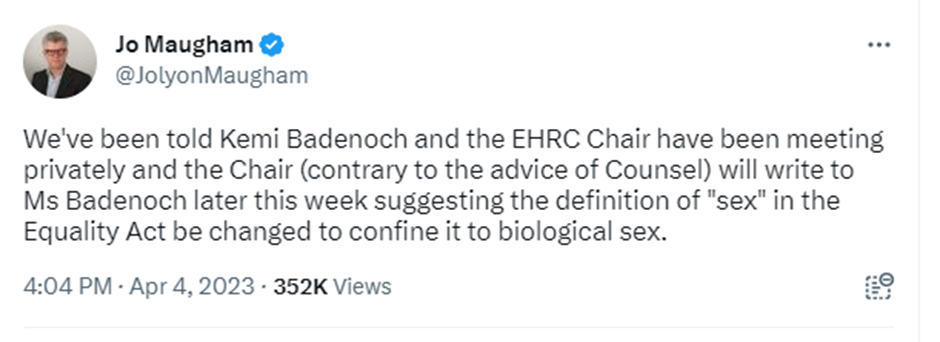
Acting independently was another requirement made by GANHRI, so this is another area that the EHRC are failing to comply with. Furthermore, GANHRI made it very clear in their recommendations that the EHRC should better engage in consultation with LGBTQLGBTQ LGBTQIA+ is an inclusive term that includes people of all genders and sexualities, such as lesbian, gay, bisexual, transgender, questioning, queer, intersex, asexual, pansexual, and allies. While each letter in LGBTQIA+ stands for a specific group of people, the term encompasses the entire spectrum of gender fluidity and sexual identities. https://abbreviations.yourdictionary.com/what-does-lgbtqia-stand-for-full-acronym-explained.html https://en.wikipedia.org/wiki/LGBT+ groups. yet they have completely ignored this.
Moreover, it is evident from the EHRC letter’s Annex that reference is made to a book (Sex and Gender: A Contemporary Reader) that has not been published and is not due for release until August 2023.The EHRC therefore quotes from a book by known trans hostile activists and lobbyists, and yet is unpublished.
It is clear that notable contributions to the EHRC’s position are still being taken exclusively from trans hostile groups and individuals, indicating once again that the EHRC continues to collude with those determined to remove the rights of the transgender community..
Their clear failure and total disregard for the human rights of arguably the most vulnerable minority in the UK today has therefore resulted in a further submission by us this week to the United Nations, demanding that action now be taken against the EHRC.
This truly is a matter of ‘life and death’ and action is required now to ensure the UK has an independent National Human Rights Institutions capable of holding the Government accountable, instead of being another political tool in the clear erosion of human rights in the UK.
One thing is for sure though, as it currently stands the EHRC is not for purpose and completely failing in its mandate. Without the removal of those who have been openly trans hostile on the Board, which in our opinion include Henderson, Goodhart, Reindorf and Ahmed plus also the Chair, Falkner, who are all politically compromised and deeply prejudiced against transgender people, it will remain so.
Alongside the UK Government, the EHRC have helped to destroy the UKs previously well regarded international reputation on human rights, substantially diminishing our standing on the world stage.
Only time and history will show if this heinous action will actually amount to genocide, but there is a genuine fear that unless this and all the growing attacks on the trans community are seriously curtailed, this is a distinct possibility – this truly is a matter of life and death, and nothing can be more important than that.




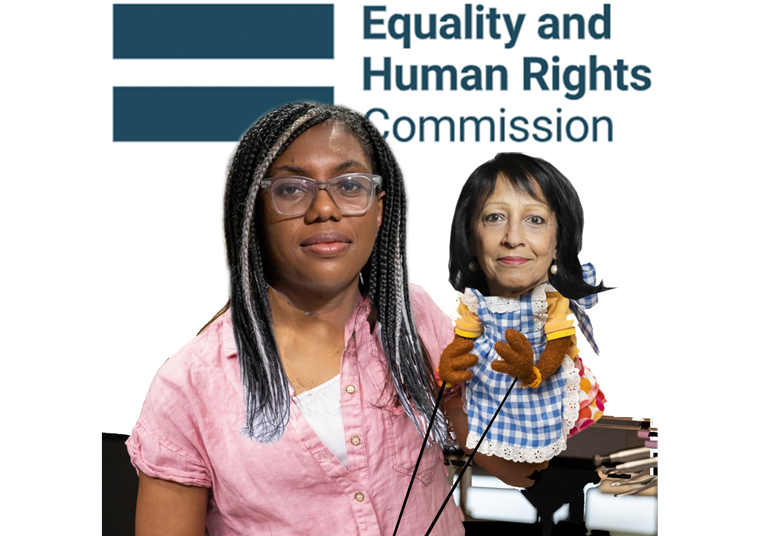

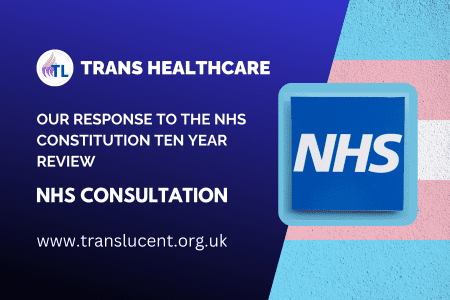
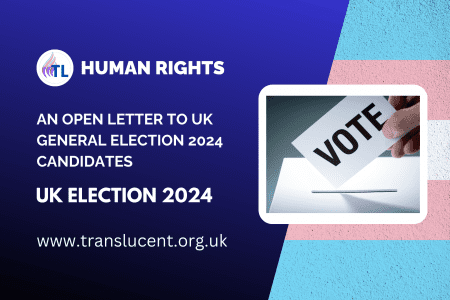
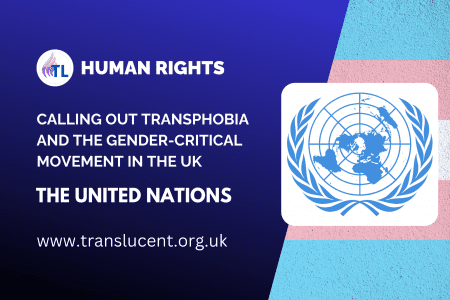
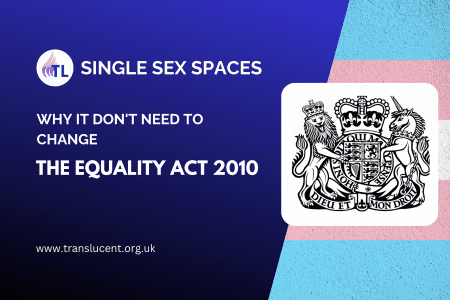

 To provide the best experiences, we use technologies like cookies to store and/or access device information. Consenting to these technologies will allow us to process data such as browsing behaviour or unique IDs on this site. Not consenting or withdrawing consent, may adversely affect certain features and functions.
To provide the best experiences, we use technologies like cookies to store and/or access device information. Consenting to these technologies will allow us to process data such as browsing behaviour or unique IDs on this site. Not consenting or withdrawing consent, may adversely affect certain features and functions.